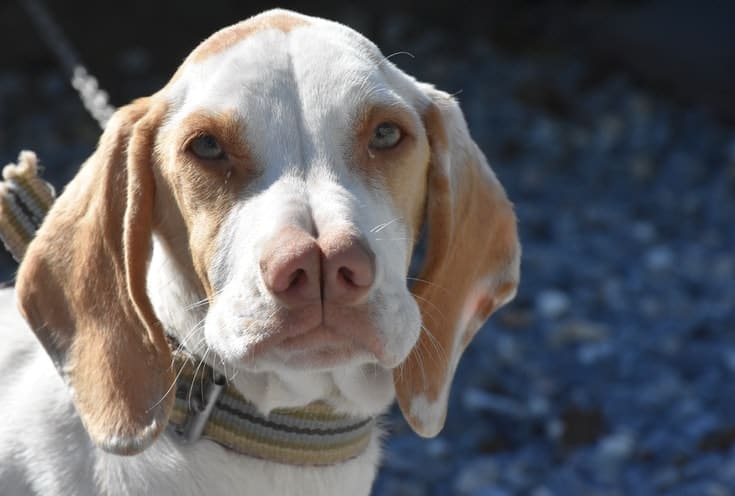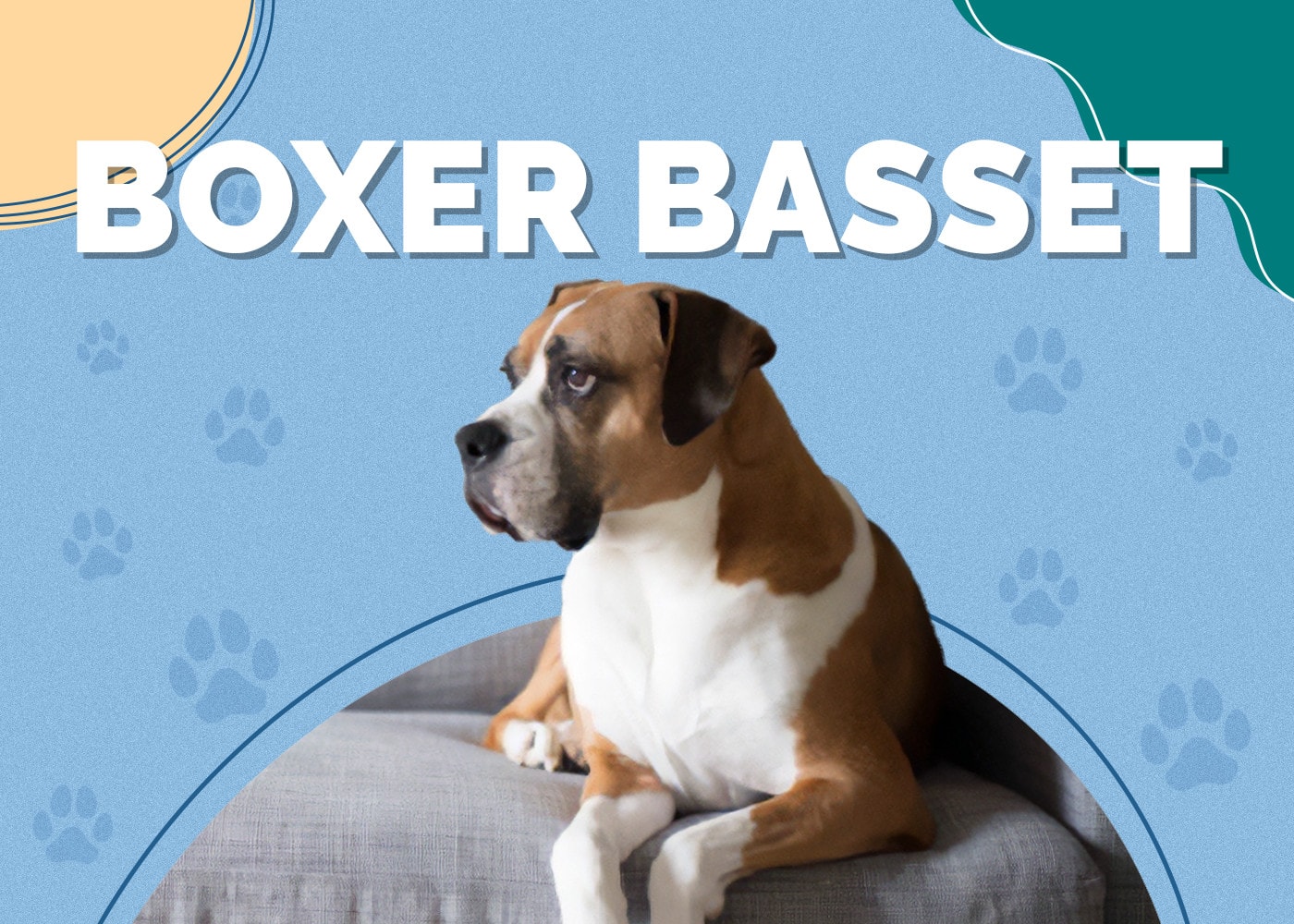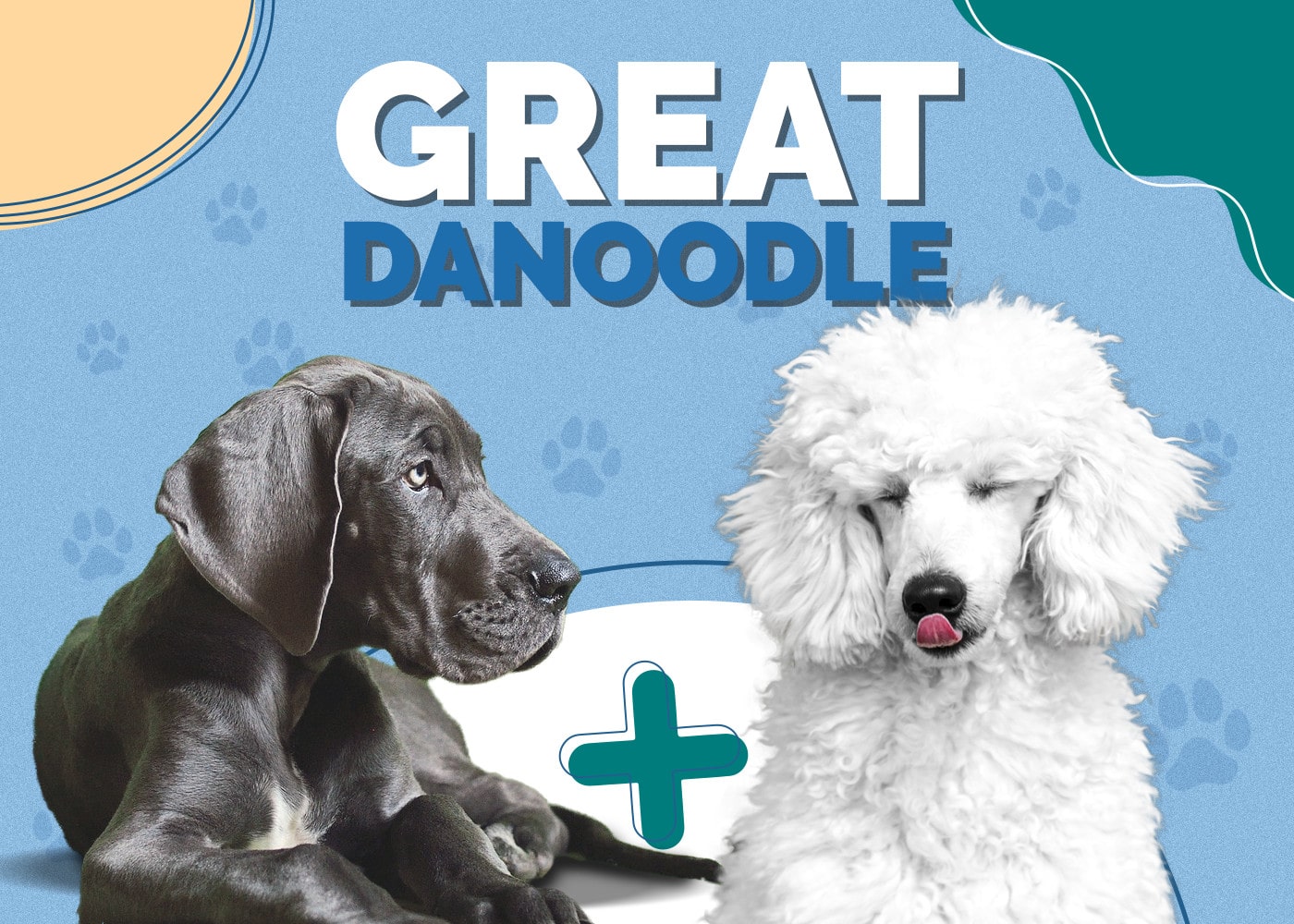Chion (Chihuahua & Papillon Mix): Info, Pictures, Characteristics & Facts
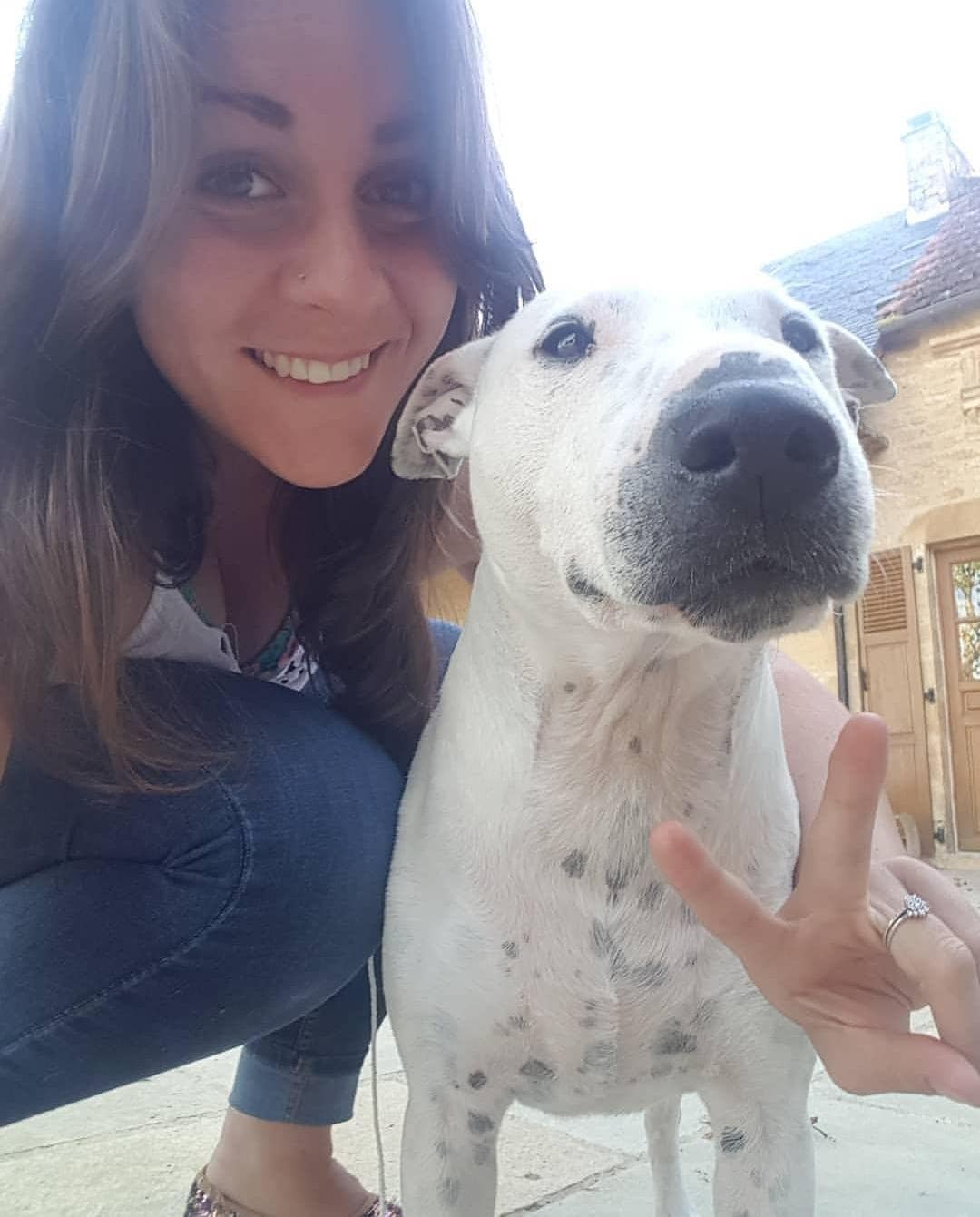
By Emma Braby
Updated on
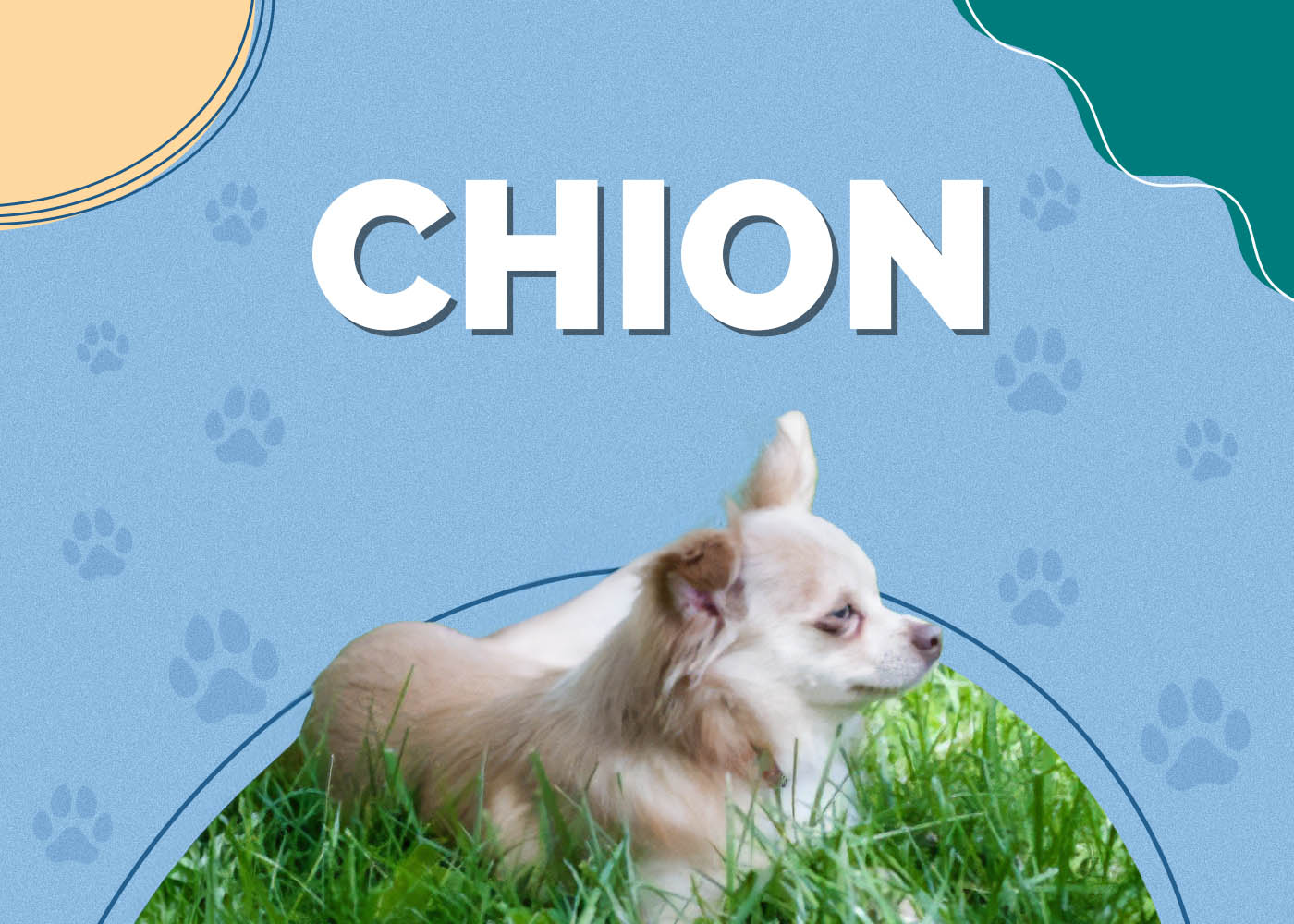
Height:
8–11 inches
Weight:
6–10 pounds
Lifespan:
10–15 years
Colors:
Black, brown, white, cream, golden, chocolate, fawn, tricolor, or a combination of these
Suitable for:
Families with older children, families who are at home for most of the day, less active families
Temperament:
Loyal, loving, needy, feisty, stubborn
The Chion is the puppy product of the Chihuahua and the less famous Papillion. With flowing gorgeous locks, pointy triangle ears, and the roundest puppy dog eyes, the Chion is a charming canine who is sure to make everyone swoon.
Do not let his puppy dog eyes fool you, though. He is a feisty pooch who does not take rubbish from anyone! He makes a fantastic watchdog and he will stand in the way of danger to protect his master if he feels the need to. He often sees himself as the “top dog” in the house, so he needs a firm leader who can show him the ropes.
This mixed toy dog is very proud and dignified, and he knows exactly what he wants and that he deserves the very best. He loves the life of luxury, lazing in laps all day long. Full of charm, we think that you will fall hard for this chirpy Chion in no time.
After reading this guide, you will know everything you need to know about whether the Chion is the dog for you. So, let’s jump straight in.
Chion Puppies
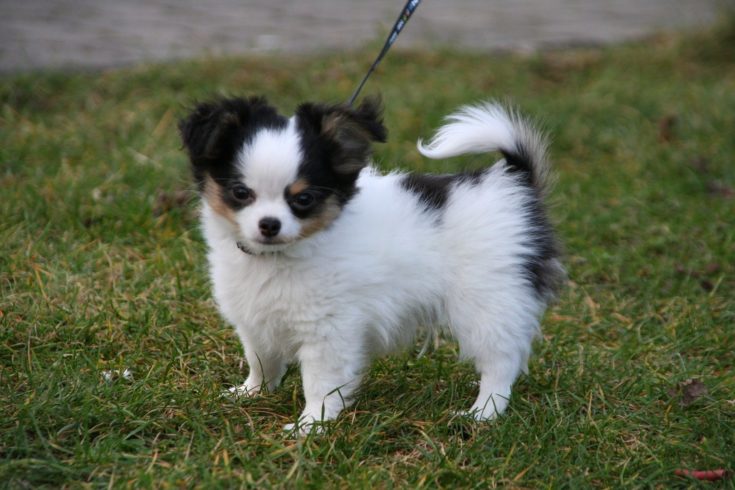
This dainty dog usually inherits the best of both his parent’s personalities, but as with any mixed breed, you need to be sure that you like both of his parents.
The Chion craves human company, so if you are a family that works long hours, or loves to travel without the dogs in tow, the Chion is not for you. He will become anxious very quickly if left alone for too long, and despite his little jaws, he can be very destructive. So, not only do you need to be sure that you can spend most of your day with him, but you will also need to invest time into crate training. We’ll cover this in the training section, but everyone benefits from crate training!
Toy dogs who crave human interaction often develop over-protective tendencies, which is known in the canine behavioral world as “little dog syndrome”. This is characterized by undesirable behaviors that are aggressive, possessive, and potentially dangerous. The only way to prevent this from happening is to be strict with the Chion and ensure that he does not rule the roost. The Chion needs a firm leader who is not afraid to enforce the rules. Dogs need rules, and despite what many owners think, having order and a pack leader creates a harmonious household where pups are most happy.
The Chion is a petite pup who ideally should be placed with a family with older children, as younger children can be too overzealous and the Chion is not that tolerant. This is completely down to personal preference, but many Chion owners find that their Chion’s tend to keep out of the way of energetic kids and can get quite grumpy. If you are looking for a canine companion who can keep up with the kids, you should opt for another breed such as the Chusky.
3 Little-Known Facts About the Chion
1. The Chion has many other names
The Chion is also known as the Pap-Chi, Papihuahua, and Chi-a-Pap.
2. The Chion can have different coats
Depending on the coat of his Chihuahua parent, the Chion can have a short to medium coat or a medium to long length coat. The type of coat he has will affect his grooming regime.
3. The Chion makes a fantastic watchdog
If you are looking for a watchdog that will alert you to everything and everyone, look no further than the Chion. This is great if you have a lot of trouble around the neighborhood, maybe not so much if there are noise restrictions in place.
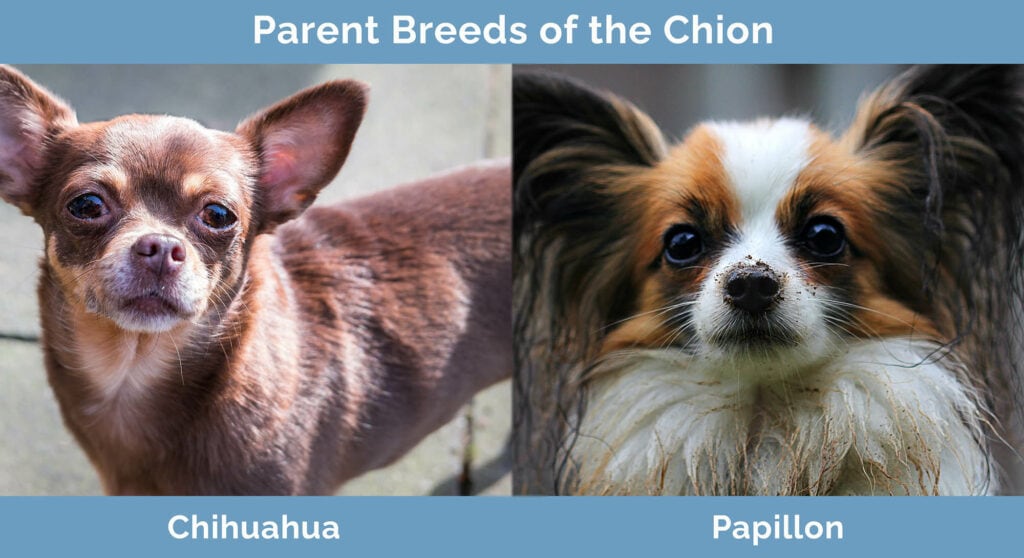
Temperament & Intelligence of the Chion 🧠
The Chion is a lovely little pooch who is seriously affectionate and cuddly with his immediate family. Nothing will please him more than being with his master and curling up on their lap and receiving all of their attention. He will usually prefer his master’s lap, but he will happily sit in the lap of anyone calm, relaxed, and ready to provide belly rubs.
When he is finished snoozing, he transforms into an energetic ball of fluff and he will bounce off the walls. He will love a game of fetch or tug-of-war with his family, and he will master the zoomies in no time! Although he is small, he is agile and quick, so make sure that your favorite vase is put somewhere else out of harm’s way.
The Chion hates to be alone for long periods. It is a great idea for you to invest in a few toys to keep him occupied for those times when you need to leave the house. He will become very agitated and anxious if left longer than a few hours at a time, and he will get stroppy if you turn it into a habit. This guy can hold a grudge, and because he is so small, there is no excuse to leave him at home; slip him into your bag and everyone’s a winner.
The Chion is intelligent, but he is not interested in using his intelligence. He is a very independent dog and does exactly as he pleases. He is easily bored so if you want to keep him engaged, you need to make training sessions short and sweet (a bit like him!) and very entertaining.
Are These Dogs Good for Families? 🏡
The Chion makes a great family pet for the right family. He would do best with an older family whose children know how to handle a small toy pup gently. He would also prefer a family that works from home or is elderly or retired.
Because he is so small, he also makes a great addition to couples living in an apartment in inner-cities and loves the metropolitan lifestyle. He would equally do well in a larger home, but the space would be wasted on him. He likes to keep his eyes on you, so no matter how big your yard, he will be under your feet wherever you go.
Does This Breed Get Along with Other Pets? 🐶 😽
The Chion gets on well with other pets, just as long as he is still the center of attention. He would prefer calmer animals – a boisterous Doberman might be too much to handle. What is great about the Chion is that he is not afraid to voice his opinion, so he’ll be sure to tell his canine siblings off if they get too rough with him.
He can be overprotective of his master, and if he is allowed to get away with the undesirable behaviors we mentioned above, he might not take kindly to another dog stealing his spot on the sofa or his master’s affection. Be sure to have a controlled pre-meet with any new animal family members so that you know everyone gets along before you commit to anything permanent.

Things to Know When Owning a Chion
The Chion is a cheery little canine, but he needs certain things in order to be his cheery self. Let’s take a look at his specific needs.
Food & Diet Requirements 🦴
The Chion will need a kibble that is specifically designed for toy and small breeds. Not only do they have specific nutritional needs compared to larger breeds, but he will also need smaller kibble pieces; otherwise, he will simply not be able to fit them into his mouth.
Small dogs are also known to suffer with Hyperglycemia, which is essentially unstable blood sugar levels. To appease his body, feeding him little and often will help to stabilize his sugar levels. Puppy Chions should be fed around 4 meals a day, and an adult Chion around 3 meals a day.
High-quality dried kibbles are the best type of nutrition for the Chion. Not only do they contain a well-balanced diet with plenty of vitamins and minerals that he cannot get from meat alone, but they also help to break down the buildup of plaque in his compact mouth. Both of his parents lose their teeth from around 8 to 10 years because they suffer terribly from periodontal diseases. Dried kibbles are known to help with this.
This spoilt doggy also loves snacks, so be sure to keep everything edible under lock and key! Not only for the snacks that he loves, where he will pile on the pounds, but also for the things that he is not supposed to eat. His tiny body only has to eat a little of what he should not to result in a trip to the veterinarian.
Exercise 🐕
The Chion does not need a lot of exercise and he fares relatively low on the canine exercise scale. A short walk around the block twice a day will be plenty for the Chion.
In between walks, he will tire himself out with his zoomie sessions and playtime. This is a big part of his appeal to many families, and why he makes a great companion for the elderly.
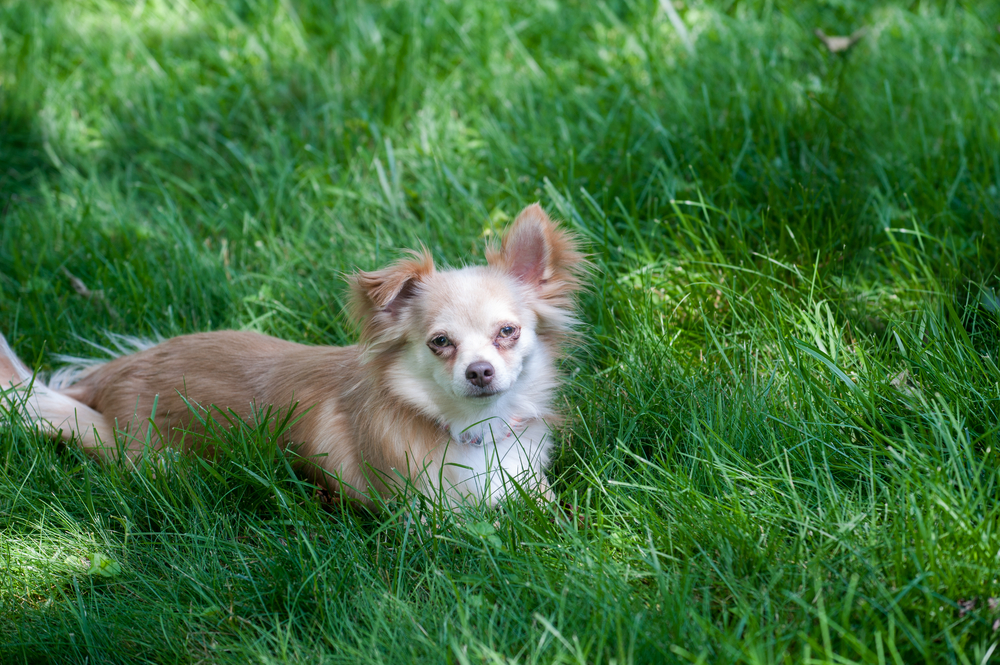
Training 🦮
The Chion needs a lot of socialization as a pup if you want him to grow into a polite pooch. Introduce him to as many dogs as you can, both small and large, and make this experience as pleasant as possible. This will not only ensure his overprotective traits are kept to a minimum, but it will also increase his confidence massively.
Crate training is also key to ensure that he has a safe space in the home, and so he can retire when he needs timeout away from his annoying siblings. It is also important for your peace of mind so that you can leave him at home for a few hours while you go to the grocery store. You will need to get the right size crate for his tiny frame because if there is a gap, he will be straight through it.
Positive reward training is the only way to train a dog, but particularly, a dog as sensitive as the Chion. Be easy on the treats, but a few here and there with plenty of verbal praise is the best way to train him. Any shouting or scalding will only result in a sulky diva doggy, and you can be sure that he will not participate in any of your training sessions again.
Grooming ✂️
This will be dependent on whether he inherits a shorter or longer coat. If he inherits the shorter coat, a brush once or twice a week will be enough to keep him looking healthy. If he inherits the longer and feathered coat, he will need brushing most days or every other day to ensure tangling and matting are kept at bay.
His eyes will need regular cleaning because it is very likely that he will inherit the bugling eyes of his Chihuahua parent. Not only do they pick up dirt much easier, but they are also prone to injuries. His larger than life ears, thanks to his Papillon parent, will also need weekly cleaning to avoid any bacterial infections. The Chion will need regular nail clipping as he does not exercise much. If you have never done this before, ask your veterinarian or groomer to show you how it is done.
Health and Conditions ❤️
The Chion is a relatively healthy dog who enjoys a long lifespan of 10 to 15 years. Being a mixed pup, he can inherit the health concerns of either parent, but his genetic diversity often makes him more resilient against illnesses. Be sure to make yourself familiar with the common health concerns that the Chion might be susceptible to:
- Eye injuries
- Progressive Retinal Atrophy
- Periodontal diseases
- Deafness
- Patellar Luxation
- Color Dilution Alopecia
- Hypoglycemia
Male vs Female
There is not much difference between male and female Chions. The main difference is that the male Chions are usually on the slightly bigger end of the height and weight scales compared to their sisters.
Training has a bigger impact on their personality compared to their gender, but some Chion owners state that males tend to be more energetic and boisterous, and female Chions prefer the more relaxed pampered life.
Final Thoughts:
The Chion is a cute and cheery pup that loves to be the center of attention. Not only does he need constant interaction, but he also likes company and the finer things in life. The Chion likes a little bit of exercise every day, but you will not find him getting down and dirty in the local doggy park.
If socialized and trained well he is an adorable addition to most families, just be sure that everyone in the family realizes he is not a teddy bear, but a toy dog who needs all the calm attention! He will bark all day long if you allow him, so be sure to stick to the rules and teach him perfect puppy etiquette.
See also:
- ShiChi Dog (Shih-Tzu & Chihuahua Mix): Info, Pictures, Facts
- Chipit (Pitbull & Chihuahua Mix) Info, Pictures, Traits
Featured Image Credit: Martin Haas, Shutterstock




